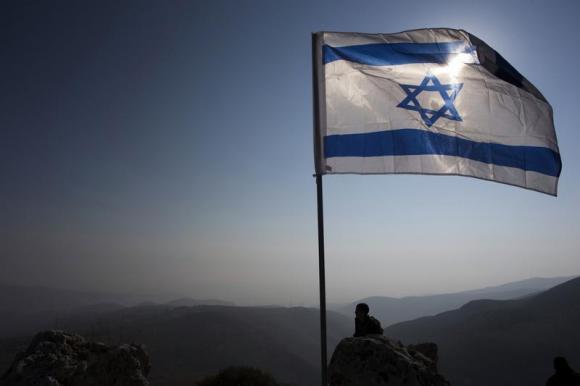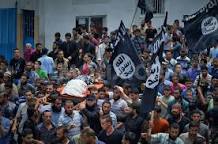The Islamic State poses a Global Airline Security Threat
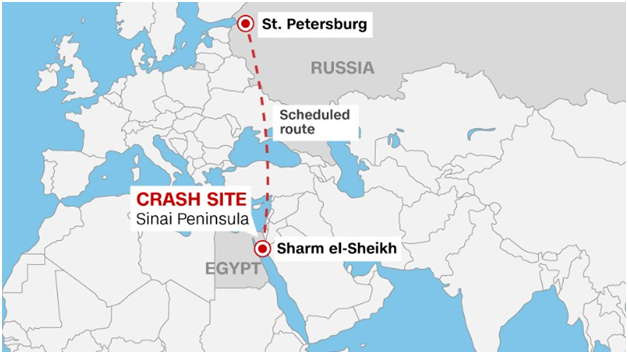
Metrojet 9268 Flight Schedule, October 31, 2015.
Saturday morning, October 31st, Flight 9268 a Metrojet Airbus A321 with 224 largely Russian tourists, and crew aboard were bound on a course for St. Petersburg from Sharm el-Sheikh on Egypt’s Sinai Red Sea. The aircraft reached an altitude of 31,000 feet at 430 knots, when something catastrophic occurred at 23 minutes into the flight. Communications with the pilot abruptly ended, the plane struggled to gain altitude and just as suddenly plummeted earthward with the tail section broken off and the rest of fuselage sent crashing into the desert and mountains were a flash was seen via satellite.
All 224 passengers and crew aboard were killed. The crash occurred less than 300 miles from the resort area at the tip of the Sinai Peninsula at the mouth of the Red Sea. The passenger remains and aircraft debris were scattered over a wide area. All of this was recorded in real time on satellite flight status internet reports and satellite imagery. Forensic teams from Egyptian, Russian and Airbus air safety organizations were dispatched to retrieve the flight data recorders. Egyptian military and Red Crescent teams were engaged in recovery of the remains, personal effects and luggage of those killed in the crash.
Grief was overwhelming at funerals held in Russia this week with the arrival of the remains of the victims. The immediate questions were what caused the aviation catastrophe and who may have been behind it.
Watch this CNN video on “Did a Bomb take down Metrojet Flight 9268?”:
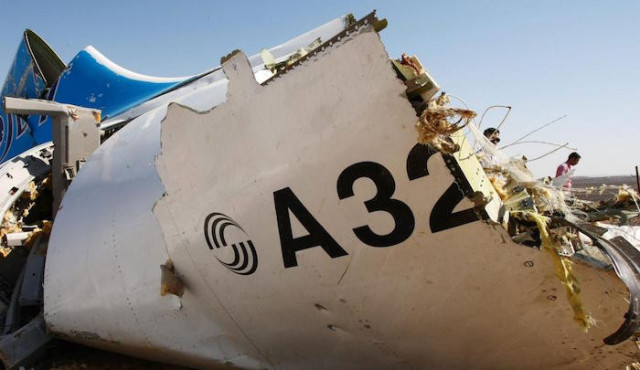
Metrojet Flight 9268 Tail section. Source: AFP
If the emerging facts surrounding the fate of Metrojet Flight 9268 are confirmed this aviation disaster, possibly perpetrated by Islamic terrorists, could well be Russia’s 9/11. Shoshana Bryen of the Washington, D.C.-based Jewish Policy Center suggested that in an American Thinker blog, “Could the destroyed Russian plane be jihadi payback?” The inference being that the bombing of Metrojet Flight 9268 was a deadly rebuke to Russian President Putin for his entry in the Syria conflict attempting to bolster the faltering Assad Regime in alliance with Shia extremist Iran and its proxy Hezbollah. Boaz Bismuth writing in Israel Hayom penned an op ed about the alleged bombing with the prescient title, “ISIS aims for the global skies.”
A lot is at stake, as the Sinai had become a veritable Islamic terrorist venue with Al Qaeda, Muslim Brotherhood and ISIS echelons attacking Egyptian security forces. Sharm el-Sheik is a major European tourist destination attracting millions of visitors annually from the EU, Russia and other countries. For the El-Sisi government, terrorist involvement in the aviation disaster in the Sinai would have a chilling effect on billions in income from tourism. For Russia it could be an un-reckoned threat arising from its entry in the Syrian conflict. It is seeking to keep at bay Caucasian and other Russian Muslims from flocking to join the self-declared Caliphate, the Islamic State. For the international airline industry it may have profound implications for assuring security for passengers and operations both at home and in destinations adjacent to jihadist conflict zones. If airport or airline servicing contractors were involved, then a major security gap would be opened by this latest aviation terrorism episode.
Several theories were developed as to what caused the aircraft to go through violent maneuvers. The aircraft may have been hit by a shoulder held air defense heat seeker missile or MANPAD, it might have suffered a high altitude structural failure which caused it to break apart or the aircraft could have suffered an internal bomb explosion. Both the MANPAD and structural failure explanations were dismissed in view of the altitude at which the incident occurred, 31,000 feet , exceeding the maximum altitude of MANPADs, 15,000 feet. Moreover the high altitude structure failure possibility was obviated by the service record of the Metrojet aircraft indicating that it had undergone structural repairs after a 2001 incident that occurred on a rough landing. The bombing possibility, while initially dismissed, became a palpably plausible on Wednesday, November 4th. Both UK and U.S. intelligence suggested they had intercepted electronic information indicating that an explosive device may have been secreted on board Metrojet Flight 9268 by possible operatives of ISIS groups active in the Sinai Peninsula. Perhaps they were posing as local catering and cleaning contractors with access to the aircraft. Egyptian Muslim Brotherhood or ISIS operatives could have secreted a bomb in the rear lavatories or rear luggage holds on the Metrojet A321.
Evidence is mounting to the ultimate conclusion that this might have been a bombing. Shoshana Bryen indicated that photographs of the aircraft wreckage in British media “show some of the holes in the wreckage. They are outward-facing – meaning something inside the plane moved out. A blown fuel tank – which is on the outside – would have caused inward-facing holes.” Then there were reported forensic evidence of metal shards among the clothing and effects of the victims. Bryen also cited reports “indicating that security at Sharm el-Sheikh was totally lax; which helps make the case that someone inside did the job. Since Egyptian tourism and Russia are targets of the Muslim Brotherhood and ISIS respectively, and since ISIS came from the MB root, collaboration here is a twisted “win-win” for them.”
‘UK PM Cameron underlined the increasing evidence of a bomb plot to destroy, Metrojet Flight 9268, saying, “It is ‘more likely than not” that a bomb brought down the Metrojet over Egypt’s Sinai Peninsula”. He took extraordinary measures grounding all UK charters for a security sweep at Sharm el Sheikh airport leaving more than 3,500 British passengers delayed until given clearance. CNN cited Cameron’s office issuing a statement saying, “Outbound flights from the UK to Sharm el-Sheikh remain suspended and the Foreign Office continues to advise against all but essential travel by air to or from Sharm el-Sheikh airport, but we are continuing to work with the Egyptians to get back to normal service as soon as possible.” Similar announcements came from Irish authorities and Lufthansa. Sharm el-Sheikh is visited by more than 1 million tourists, annually.
The Israeli resort of Eilat at the head of the Red Seas also is a major European and international tourist destination. ISIS Sinai affiliate formerly known as Ansar Bait al-Maqdis has targeted Eilat for a possible bombing attack. The possible ISIS terror bombing of the Metrojet could have rippling effects there to assure the usual tight security arrangements of Israel international carrier, El Al, and domestic ones like Arkia. El Al aircraft are already equipped with electronic counter measures like the Elbit C-Music anti- missile system to foil possible MANPAD attacks. Doubtless, the Israelis may also have better security clearances for aircraft maintenance, catering and cleaning employees, as well as barriers and surveillance of the Egyptian border to thwart infiltration of MB and ISIS terrorists.

ISS Facility Services Receives State of Utah Refugee Services Employer of the Year 2009.
ISS Facility Services Receives State of Utah Refugee Services Employer of the Year 2009
The downing of the Metrojet with its innocent Russian victims has more than just Russian, Egyptian and Israeli concerns. From investigations by the Wall Street Journal, CNN and others, security clearances for baggage handlers, catering, and cleaning personnel with access to the tarmac and aircraft here in the U.S. is lax.
Further investigations by the Lisa Benson Radio Show National Security Task Force of America have revealed employment of Somali refugees by major international groups like ISS Worldwide A/S headquartered in Copenhagen. The US subsidiary ISS Facility Services, Inc. is based in San Antonio. ISS Worldwide employs over a half million through their outsourced network of airport and commercial facilities maintenance contracts. ISS specializes in a broad range of facility management services including janitorial services, especially for airport authorities and major manufacturing companies.
The Somali Muslim émigré population has been the source of both Al Shabaab and increasingly ISIS recruitment in the U.S. One illustration of the inherent ISIS risk among U.S. Somalis employed at US airports was the reported death in September 2014 of American Somali Émigré ISIS Jihadi

The late ISIS Fighter a former Twin Cities airport cleaner.
The late ISIS Fighter a former Twin Cities airport cleaner
Abdirahmaan Muhumed, 29. That revealed his employment as a cleaner for Delta Global Services, Inc. that gave him security access to Minneapolis-St. Paul International Airport. Muhumed left behind 9 children in the Twin Cities to become an ISIS jihadi, before his death in Syria. Muhumed had unfettered access to jetliners at the airport, which handles 90,000 passengers a day. He also had access to the tarmac and special security clearance to other parts of the airport. Muhumed had no criminal record in the United States that would have prevented him from getting a job at the airport.
This revelation following the death of Somali émigré ISIS fighter Muhumed, should raise the concerns of both the TSA and Homeland Security regarding screening of airport and aircraft maintenance personnel at U.S. Many of who have contracts with groups like ISS Worldwide A/S and Delta Global Services, Inc. Moreover, without active community policing programs in the major U.S. communities recruitment of Muhumed and other ISIS recruits could not have been detected. Thus, the downing of the Metrojet in Egypt by alleged ISIS perpetrators reverberates here in the U.S. FBI Direct James Combey has warned that ISIS jihadis lurk among us in all 50 states.
RELATED ARTICLE: ‘Unvetted foreigners’ working as U.S. baggage handlers
EDITORS NOTE: This column originally appeared in the New English Review.

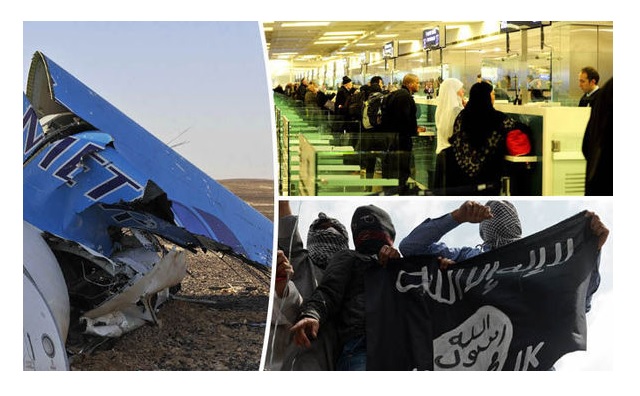



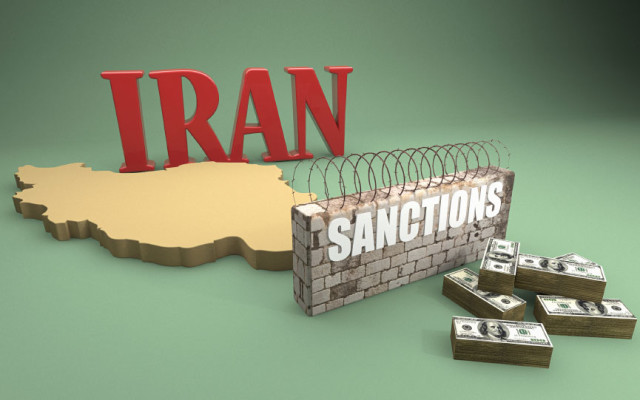
 David B. Rivkin, Jr., Esq.
David B. Rivkin, Jr., Esq.
